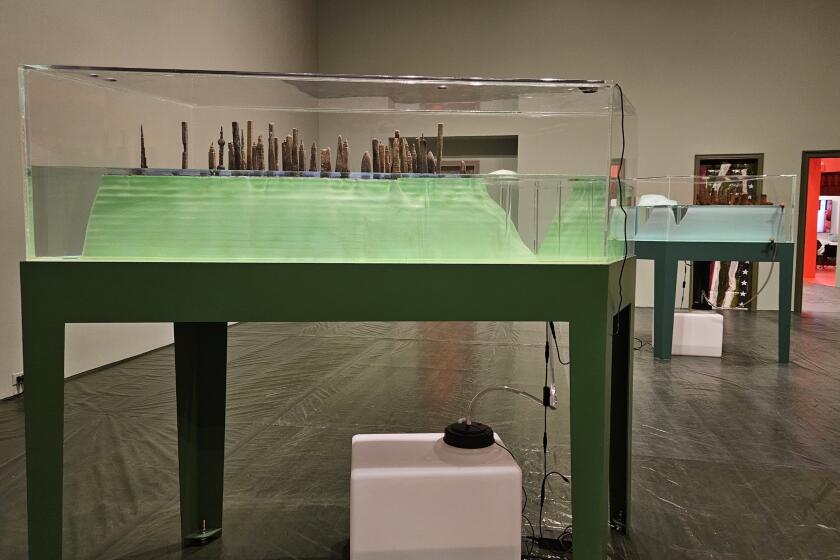Composer is larger than life; concert isn’t
Ban Ki-moon should probably not get used to being serenaded every time he returns from official business overseas. But the United Nations is still in a welcoming mode for its new secretary-general, and Friday night it threw a special and quite strange concert in his honor two hours after he returned to New York from an 11-day, nine-country tour of Africa and Europe that ended his first month in office.
The evening was really a tribute to Ennio Morricone. The famed 78-year-old Italian composer has worked on at least 505 films (who’s counting?), written dozens of concert works, conducted his music at lots of big-deal places such as the Kremlin in Moscow and the Parthenon in Athens and will shortly receive an honorary Oscar.
For the record:
12:00 a.m. Feb. 9, 2007 For The Record
Los Angeles Times Friday February 09, 2007 Home Edition Main News Part A Page 2 National Desk 1 inches; 33 words Type of Material: Correction
Ennio Morricone: A review in Monday’s Calendar of a U.N. concert conducted by Ennio Morricone listed “Il Postino” among his film scores. The original music for that movie was written by Luis Bacalov.
But until Friday he had never appeared in North America. His official United States debut (the U.N. is international territory) was Saturday at Radio City Music Hall. The Museum of Modern Art and Film Forum are also busily acknowledging the composer of the “The Good, the Bad and the Ugly,” “Il Postino,” Pier Paolo Pasolini’s unbearably unpleasant “120 Days of Sodom” and such non-classics as “When Women Lost Their Tails” and “Lulu the Tool.”
All New York seemed, in fact, abuzz with Morricone. Press jostled for interviews, many of which he promised and then blew off. Exactly why the Italian composer would be the composer to welcome the U.N. South Korean secretary-general was anybody’s guess, although Morricone has a taste for grand settings and the U.N. General Assembly is certainly that. Although not common, concerts are occasionally given here for special occasions. Late in December, Daniel Barenboim conducted his West-Eastern Divan Orchestra, comprising young Arab and Israeli musicians, for outgoing Secretary-General Kofi Annan.
In brief remarks Friday, Ban did note, in halting English and with a wry sense of humor, that the good, the bad and the ugly were not unknown to the United Nations and the drama of Morricone’s music was an appropriate soundtrack for his first few weeks in office.
The speeches lasted about an hour, and besides the official greetings were appearances by “celebrities and stars of the stage and the screen.” The real goal of the evening, saved for the back page of the program, was to promote the U.N.’s Millennium Development Goals of addressing the world’s extreme poverty as well as pressing world environmental, education and health issues. Among those speaking on the goals Friday were actor Eli Wallach, jazz guitarist Pat Metheny and Miss Universe 2006 Zuleyka Rivera Mendoza of Puerto Rico. Lou Reed, introduced as a brutally honest rocker, remarked on the billion people without access to clean water, bitterly noted how he, like all New Yorkers, have benefited from the abuse of the poor and insisted the U.N. help extract us from Iraq.
Morricone’s concert, which followed, was entitled “Messages of Peace” but didn’t neglect the violence he is so good at depicting with inspired understatement. The general assembly is a stirring setting for music, but, designed for spoken word, its acoustics are poor. Clearly the agency has much more important priorities than a good music sound system (although I suspect the engineers were more the problem than the equipment) or even cleaning the rugs or maintaining the building. But sadly everything sounded pretty awful.
The everything included the Orchestra Roma Sinfonietta, which works regularly with Morricone, along with the Canticum Novum Singers and choruses from New York University and State University of New York, Buffalo, all stuffed onto the stage and the speaker’s podium.
Morricone’s music can be outrageous, but he is not. His scores have long delighted with their wild instrumental and stylistic non sequiturs. On the podium, however, Morricone is a martinet. His stick technique is adequate, but his charisma as a conductor is zero. He doesn’t smile -- ever.
Where the music comes from, and in astounding color and gushing quantities, becomes, then, a mystery. Be it the shameless sentimentality of “Postino,” the wild and woolly spaghetti-western scores where weird instruments memorably wail, or the potent understated use of silence and sound effects, Morricone’s film work is regularly larger than life and has the ability to elevate all it underscores.
Friday night, tuba, drums and chorus dutifully bleated in an excerpt from “Burn!” (starring Marlon Brando); drippy piano arpeggios soon joined by horn, tuba and bells led to the wonderfully Euro-trash faux-Brandenburg style of an obscure Italian comedy, “H2S”; a steel guitar stuck out in the score to “Sicilian Clan”; there was all the swinging ‘60s finger-snapping seduction you could ever hope for in music from “Love Circle.”
Dourly beating time, Morricone conveyed no pleasure in any of these radical stylistic shifts. Given the amplification turning strings to slush and a solo oboe tone into something piercing enough to make your hair stand on end, I began to wonder how I ever fell in love with the music from “The Mission.”
And then there was “Voices From Silence,” a 26-minute cantata written in 2002. It memorializes Sept. 11, and it reminds us of Morricone’s background as a serious composer. Here he seems to have picked up where he may have left off from his student days studying the avant-garde music of the ‘50s. There are gloomy thick chordal textures in chorus and orchestra. Prerecorded voices add Penderecki-like sound effects. A drippy text by Richard Rive is read.
The performance may not have been a fair representation of the music, which couldn’t be properly appreciated through electronic haze. Morricone’s conducting was not life-giving. And few of us have any perspective of Morricone as a concert composer. For all his fame and the riches he has amassed, for all the interest in his film work, he seems unable to attract interest in such serious work, at least outside of Italy.
Still, Ban could have done worse. Morricone’s music finds fun in the good, the bad and the ugly, which must have been a pleasant respite, however brief, from the real world.
More to Read
The biggest entertainment stories
Get our big stories about Hollywood, film, television, music, arts, culture and more right in your inbox as soon as they publish.
You may occasionally receive promotional content from the Los Angeles Times.







